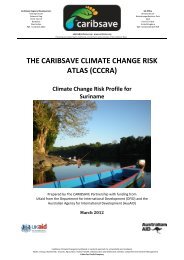You also want an ePaper? Increase the reach of your titles
YUMPU automatically turns print PDFs into web optimized ePapers that Google loves.
tourism <strong>and</strong> agriculture. While <strong>Turks</strong> <strong>and</strong> <strong>Caicos</strong> has been classified as an middle-upper income group<br />
country the recent impacts of the 2008 hurricane season <strong>and</strong> the global economic recession have all<br />
contributed to the weakening of the economy. This is likely to affect the social structure of the territory,<br />
altering the percentage of the poor <strong>and</strong> possibly increasing the percentage of vulnerable persons in society.<br />
However, the territory’s Draft Climate Change Policy addresses the main needs of the health care sector<br />
<strong>and</strong> may be sufficient given the current low incidence of most communicable diseases in the territory.<br />
Nonetheless the impact of climate change on health in the <strong>Turks</strong> <strong>and</strong> <strong>Caicos</strong> Isl<strong>and</strong>s should be addressed<br />
aggressively due to the higher cost of health care <strong>and</strong> the dependence on overseas health care institutions.<br />
Further research of the association of disease incidence (e.g. acute respiratory infections <strong>and</strong><br />
gastrointestinal diseases) <strong>and</strong> other sectors such as tourism <strong>and</strong> water should be undertaken. This will<br />
benefit the economy <strong>and</strong> society of the <strong>Turks</strong> <strong>and</strong> <strong>Caicos</strong> through increasing the country’s resilience to the<br />
impacts of climate change <strong>and</strong> offering better adaption options. Increased research <strong>and</strong> validation of data<br />
for example with diseases of low prevalence such as malaria should be given greater attention in their<br />
infancy with respect to their threat to national health. Such research will pave the way for a sound platform<br />
from which to inform policy <strong>and</strong> planning for the future as the climate changes.<br />
7.6. Marine <strong>and</strong> Terrestrial Biodiversity <strong>and</strong> Fisheries<br />
The biodiversity <strong>and</strong> fisheries of the <strong>Turks</strong> <strong>and</strong> <strong>Caicos</strong> form the foundation of its economy <strong>and</strong> provide<br />
numerous goods <strong>and</strong> services to the population. The coral reefs, white s<strong>and</strong> beaches <strong>and</strong> extensive<br />
wetl<strong>and</strong>s that have earned the Isl<strong>and</strong>s the reputation of “Beautiful by Nature” are highly vulnerable to<br />
climate change due to their inherently fragile character <strong>and</strong> the various environmental threats brought on<br />
by a booming tourism industry. Like many small isl<strong>and</strong> developing states, TCI is challenged to address gaps<br />
in environmental management because of insufficient finances <strong>and</strong> a lack of available technical <strong>and</strong> human<br />
capacity. The isl<strong>and</strong>s have generally demonstrated a positive response towards addressing biodiversity<br />
issues through environmental policies that are geared towards sustainable natural resource use <strong>and</strong><br />
integration of tourism <strong>and</strong> other economic sectors into environmental management. Education on<br />
environmental issues, public participation <strong>and</strong> co-management are also promoted by the Ministry of<br />
Natural Resources. It can be expected therefore that with an intensified education <strong>and</strong> awareness<br />
campaign geared towards climate change sensitization, <strong>and</strong> its pending impacts on biodiversity, that the<br />
responsible agencies will take more rapid action to ensure completion of outst<strong>and</strong>ing projects, programmes<br />
<strong>and</strong> policy amendments for climate change adaptation, such as those outlined in the TCI Climate Change<br />
Green Paper.<br />
A joint public sector-private sector-community approach towards fish sanctuaries <strong>and</strong> MPA management<br />
can serve as a catalyst in the paradigm shift from a business as usual approach to biodiversity consumption<br />
to that of an eco-system based approach to adaptation. Along with the existing Conservation Fund, it could<br />
provide the additional financial resources that will be needed as the country attempts to improve on<br />
Protected Area management <strong>and</strong> exp<strong>and</strong>s coverage of MPAs. It is an opportunity to harness the evident<br />
willingness of communities, the private sector <strong>and</strong> the Government of TCI to conserve its biodiversity, <strong>and</strong><br />
it is also an opportunity to channel the particular interests of these stakeholders towards achieving a<br />
common goal <strong>and</strong> resolving common conflicts among resource users. Strengthening the adaptive capacity<br />
of the country’s ecosystems in the face of climate change can only be achieved within the context of<br />
collaboration. Ultimately, sustainable use <strong>and</strong> effective management of the isl<strong>and</strong>s’ biodiversity <strong>and</strong><br />
fisheries lies within the h<strong>and</strong>s of its people; the CARIBSAVE Partnership is an impartial agent that can serve<br />
as mediator between various stakeholders <strong>and</strong> provide the framework within which the adaptive process<br />
may be executed.<br />
184





